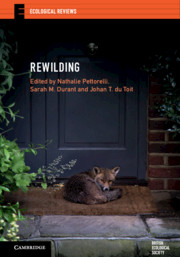Book contents
- Rewilding
- Ecological Reviews
- Rewilding
- Copyright page
- Contents
- Contributors
- Acknowledgements
- Chapter One Rewilding: a captivating, controversial, twenty-first-century concept to address ecological degradation in a changing world
- Chapter Two History of rewilding: ideas and practice*
- Chapter Three For wilderness or wildness? Decolonising rewilding
- Chapter Four Pleistocene rewilding: an enlightening thought experiment
- Chapter Five Trophic rewilding: ecological restoration of top-down trophic interactions to promote self-regulating biodiverse ecosystems
- Chapter Six Rewilding through land abandonment
- Chapter Seven Rewilding and restoration
- Chapter Eight Understanding the factors shaping the attitudes towards wilderness and rewilding
- Chapter Nine Health and social benefits of living with ‘wild’ nature
- Chapter Ten The psychology of rewilding
- Chapter Eleven The high art of rewilding: lessons from curating Earth art
- Chapter Twelve Rewilding a country: Britain as a study case
- Chapter Thirteen Bringing back large carnivores to rewild landscapes
- Chapter Fourteen Rewilding cities
- Chapter Fifteen The role of translocation in rewilding
- Chapter Sixteen Top-down control of ecosystems and the case for rewilding: does it all add up?
- Chapter Seventeen Rewilding and the risk of creating new, unwanted ecological interactions
- Chapter Eighteen Auditing the wild: how do we assess if rewilding objectives are achieved?
- Chapter Nineteen Adaptive co-management and conflict resolution for rewilding across development contexts
- Chapter Twenty The future of rewilding: fostering nature and people in a changing world
- Index
- Plate Section (PDF Only)
- References
Chapter Fifteen - The role of translocation in rewilding
Published online by Cambridge University Press: 06 February 2019
- Rewilding
- Ecological Reviews
- Rewilding
- Copyright page
- Contents
- Contributors
- Acknowledgements
- Chapter One Rewilding: a captivating, controversial, twenty-first-century concept to address ecological degradation in a changing world
- Chapter Two History of rewilding: ideas and practice*
- Chapter Three For wilderness or wildness? Decolonising rewilding
- Chapter Four Pleistocene rewilding: an enlightening thought experiment
- Chapter Five Trophic rewilding: ecological restoration of top-down trophic interactions to promote self-regulating biodiverse ecosystems
- Chapter Six Rewilding through land abandonment
- Chapter Seven Rewilding and restoration
- Chapter Eight Understanding the factors shaping the attitudes towards wilderness and rewilding
- Chapter Nine Health and social benefits of living with ‘wild’ nature
- Chapter Ten The psychology of rewilding
- Chapter Eleven The high art of rewilding: lessons from curating Earth art
- Chapter Twelve Rewilding a country: Britain as a study case
- Chapter Thirteen Bringing back large carnivores to rewild landscapes
- Chapter Fourteen Rewilding cities
- Chapter Fifteen The role of translocation in rewilding
- Chapter Sixteen Top-down control of ecosystems and the case for rewilding: does it all add up?
- Chapter Seventeen Rewilding and the risk of creating new, unwanted ecological interactions
- Chapter Eighteen Auditing the wild: how do we assess if rewilding objectives are achieved?
- Chapter Nineteen Adaptive co-management and conflict resolution for rewilding across development contexts
- Chapter Twenty The future of rewilding: fostering nature and people in a changing world
- Index
- Plate Section (PDF Only)
- References
- Type
- Chapter
- Information
- Rewilding , pp. 303 - 324Publisher: Cambridge University PressPrint publication year: 2019
References
- 7
- Cited by

